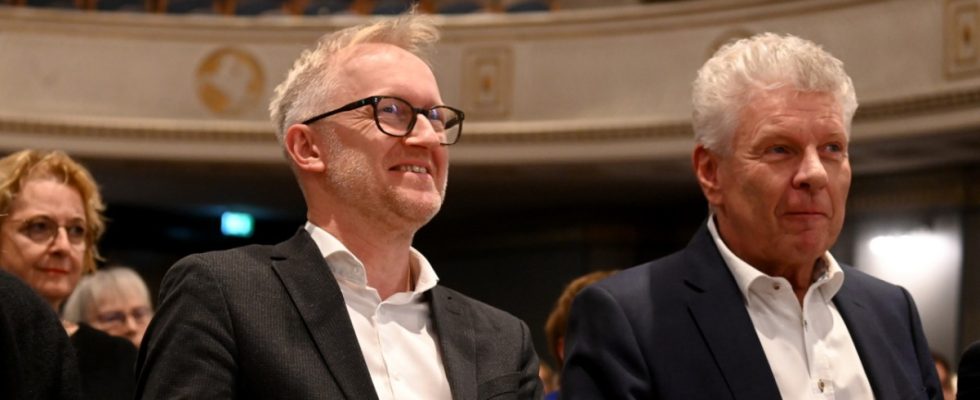There was a lot of talk about courage on Tuesday evening in the large auditorium of the Ludwig Maximilians University. This is close to the awarding of a prize named after the Scholl siblings. The way the two of them and their fellow members of the White Rose opposed the Nazi regime was courageous. No, what’s more, the word is not enough. They paid with their lives. They knew it. And did it anyway.
These deeds are so great that it is akin to presumption to award a book that “remembers the legacy of the Scholl siblings.” Lukas Bärfuss feels this. “How dare anyone?” asks the Swiss writer in his eulogy to this year’s prize winner, the Belgian historian and journalist David Van Reybrouck. The award givers, the city of Munich and the German Book Trade Association, are also aware of the gap that is emerging here, especially at the site of the historical event. Therefore, a work must only commemorate that legacy “in the broadest sense”. In addition, it should demonstrate “intellectual independence” and be suitable for “promoting civil freedom, moral, intellectual and aesthetic courage”.
Delivers the laudatory speech: the Swiss writer Lukas Bärfuss.
(Photo: Stephan Rumpf)
How did Van Reybrouck redeem this with “Revolusi”, the book originally published in 2020 in which he depicts the liberation of Indonesia from Dutch colonial rule? To do this, you have to know the special relationship the Dutch have with their colonial past. Until recently it was more of a non-relationship. Thousands of slaughters of the local population, centuries-long exploitation of a huge area on the other side of the world: people didn’t want to know about this for too long; If so, a lot of things were glossed over. And then the Belgian Van Reybrouck comes along and, after six years of work – on his own, without academic involvement, without major public funding – hits the Dutch with 750 pages in which he lets hundreds of contemporary witnesses tell what it was really like back then. The book highlights a huge gap in the neighbors’ historical awareness. And that hurts too. So painful that even the left-wing liberal newspaper Volkskrant In her review, Van Reybrouck’s actual intention, the reference to the lack of processing of the story, was not mentioned with a single syllable.
The previous book about the Congo (2010) was also courageous, in which Van Reybrouck held up a mirror to his own country about the atrocities it committed in the former colony. The manifesto (2008) was courageous, in which he sees “populism” not as a contradiction but as a complement to democracy; as well as the pamphlet “Against Elections”, in which he called in 2013 to involve citizens in legislation, who, like in ancient Athens, would be chosen by lot – an initially counterintuitive idea that has been taken up in the form of citizens’ assemblies worldwide, and soon also in Germany.
“The highest honor I have ever received”
Van Reybrouck was brave enough to design the acceptance speech for the “highest honor I have ever received” as a fictitious letter to “Sophie” and “Hans”. In it, the honoree tells them about his next book project, which is about colonialism and the destruction of the earth, this “greatest challenge of our time.” Is it allowed to unite in this way with the fighters against the all-destroying Nazi dictatorship? There may be some in the auditorium, where, in addition to city councilors and mayor Dieter Reiter, descendants of the White Rose such as Christoph Probst’s grandson and Alexander Schmorell’s nephew are sitting, who think this is delicate or not entirely permissible.
Finally, it is courageous, almost daring, how laudator Bärfuss tries to suppress any possible pride about the often praised German way of coming to terms with the past, which stands as a counter-model and role model to the Dutch one. The Germans, too, he says, have an “Indonesian history” with the colony in New Guinea, and there is also “concealment, deception, half-truths” in their dealings with it. He proves this using quick research that cannot be verified quickly. Hardly anyone would want to deny that the Germans have “no idea” about the Indonesian present, as he says, and that this contributed to the anti-Semitism scandal at last year’s Documenta surrounding the Indonesian artist collective Ruangrupa.

